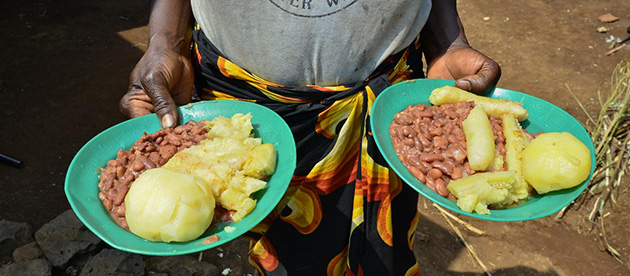Rwanda’s fight against malnutrition, which affects nearly half of all children under two, stepped up a notch this month.
A new survey targeting children under 24 months and women of reproductive age will root out the underlying causes of under nutrition, leading to new approaches to tackle the problem.
Commissioned by the Rwandan Ministry of Agriculture and Animal Resources (MINAGRI), and co-led by the Rwanda Ministry of Health (MiniSante) in partnership with CIAT, WHO, UNICEF, WFP and FAO, the survey will be supervised by the Rwandan Agricultural Board (RAB) with CIAT supporting as technical lead.
Project partners, including CIATs Director General, Ruben Echeverria, announced the new approach at the second global conference on biofortification, which took place in Kigali from 31st March to 2nd April. At the event, the partners signed a Memorandum of Understanding (MoU) committing to the work.
The survey, to be conducted later this year, will interview 2,736 households across 9 Rwandan districts that have a high prevalence of child stunting. It will assess dietary intake and biochemical indicators of iron status, which will help to understand malnutrition issues more broadly and identify the best approaches to address it as well as examine nutrition, access to markets and gender issues to see how they are related to malnutrition at household level.
Rwanda has made huge strides to decrease the prevalence of malnutrition in recent years, reducing it from 74% to 44%, but the rate among children is still high and the Government is seeking new interventions. It is hoped that this international collaboration involving the United Nations Organizations will make a significant impact in clarifying the causes of maternal and child malnutrition and identify local solutions.
The commitment of partners to improving rates of nutrition in Rwanda coincided with the announcement that the CGIAR Consortium placed the weight of its agricultural research expertise behind efforts to improve global nutrition and public health.
Nearly one third of the global population – two billion people – lack essential vitamins and minerals such as vitamin A, zinc and iron in their diet. Micronutrient deficiencies can lead to debilitating illnesses including stunting, anaemia, blindness and infectious diseases, as well as death. Women and children are especially vulnerable.
CIAT works to mainstream the breeding and dissemination of iron-rich beans in partnership with HarvestPlus and through the Pan Africa Bean Research Alliance (PABRA).
___________________________________________
This post was first published on the CIAT News blog on 29 April 2014.

